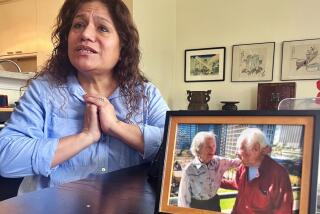Madoff’s sorry excuses
Nothing my alcoholic, belt-wielding father ever did to me as a child enraged me as much as the day he pulled me aside, said how sorry he was for his shabby parenting and stuck out his hand in a gesture of conciliation. Implicit in the remorse-by-numbers routine he’d learned at his Alcoholics Anonymous meetings was the suggestion that if he were man enough to apologize, I should be man enough to forgive him. Sorry, Pop: No dice.
I felt something along the same lines last Thursday, when Bernard Madoff appeared in a federal courtroom in Manhattan to shed a few crocodile tears. After pleading guilty to masterminding a Ponzi scheme that bilked thousands of investors out of their life savings, Madoff admitted that he had “deeply hurt many, many people” and added, “I cannot adequately express how sorry I am for what I have done.”
Here, for perhaps the first time in a quarter-century, Madoff may actually have been telling the truth. Clearly, a monster like that cannot adequately express how sorry he is for what he has done, not only because he lacks the requisite verbal skills but because, by the looks of things, he’s not all that sorry for his crimes. Genuine contrition requires restitution. But by refusing to assist the government in locating any of the $60 billion he allegedly stole, much less in refusing to identify his confederates, Madoff made no effort whatsoever to atone for his myriad crimes. This makes his mealy-mouthed apology even more offensive to his victims: I’m deeply sorry for the crimes that I committed. I regret the distress I have caused. But I’m keeping the money. And leave my wife out of this.
Where does Madoff get such chutzpah? Lamentably, the insincere, halfhearted, unoccasioned or self-serving apology has become a staple of modern life. Last year, when former New York Gov. Eliot Spitzer resigned, he had the nerve to say: “I have acted in a way that violates ... my or any sense of right and wrong.”This arch phrasing suggested that he too had been a victim of his wrongdoing, that not only the people of New York had suffered but his own sense of right and wrong had been abused. This is a perfect example of the apology that, by its refusal to address what was actually done in terms suitable for the occasion, makes the public even more livid. After all, this was a man who was wielding his terrible swift sword at white-collar criminals while cavorting with hookers on the side. He didn’t regret disgracing his wife and family or acting in a manner that violated some amorphous moral code. He regretted getting caught.
Almost any time a public figure has apologized in recent times, he has only succeeded in making a bad situation worse. When Holocaust-denying Bishop Richard Williamson finally succumbed to Vatican pressure and apologized for his heinous views, he merely expressed regret for the pain he may have caused sensitive Jews by making such comments, without actually apologizing for denying the Holocaust. He also used the inelegant expression “survivors and relatives of victims of injustice under the Third Reich” to describe the plight of butchered European Jewry, as if the Nazis were guilty of nothing more serious than putting a few bogus liens against Jewish-owned property for failure to pay back taxes.
Issuing self-serving apologies that make the victimized feel as if they are facing another round of victimization is a Vatican tradition; back in 2000, when Pope John Paul II apologized to Jews for their mistreatment at the hands of Christians over the ages, he expressed remorse for the actions of sons and daughters of the Catholic Church who might have strayed from the church’s traditional values. This suggested that the Inquisition and the Crusades were rogue operations with which the church had no official connection. The Christians who burned, blinded and immolated all those Jews down through the centuries were renegades, mavericks, free-lancers. God forbid that anyone should suggest Catholics had anything to do with it.
Bill Clinton, a penitent par excellence, made a fetish out of apologizing to anyone within earshot. In addition to issuing mea culpas to African Americans for centuries of mistreatment at the hands of their countrymen -- as if that were going to make everything even-steven -- he also apologized for the Western world’s dithering response to the genocide in Rwanda. This marvel of insensitivity suggested that he personally had had nothing to do with the decision to dither, even though he was, technically, the leader of the free world at the time. Famous for referring to his affair with Monica Lewinsky as a relationship that was “not appropriate” instead of the outrage that it was, Clinton brought the public apology to a new level of vapidity, insincerity and contempt for the truth. A master of apologizing for misdeeds that neither he nor anyone else had any intention of rectifying, Clinton could have given Richard (“I am not a crook/I let down the American people”) Nixon a run for his money.
One of the worst innovations in modern life is the My Bad Syndrome. This is the situation when malefactors apologize for doing things that no one else possibly could be held responsible for and then expect a ticker-tape parade. “At least I’m man enough to admit that I chopped down that cherry tree!” Well, you did chop down that cherry tree. We saw you with the ax. That’s the kind of apology (in a more private setting) that my father was offering me, and let me assure you, it did not have the effect he was hoping for.
Now, with Madoff’s sham apology, hasn’t the time finally come to officially ban public apologies issued by con artists, politicians, regulators, captains of industry, religious leaders and athletes? Haven’t we reached the point at which the choreographed donning of sackcloth and ashes merely pours salt into a festering wound and makes the apologist’s victims even more enraged? Wouldn’t we all be better off telling anyone who wants to apologize for his transgressions against humanity that the finest, most tasteful and most appreciated gesture of contrition would be simply to keep his mouth shut?
Perhaps we as a people need a new statute mandating that when wrongdoers appear in court, or even in the court of public opinion, they should do so with a sock stuffed in their mouths. Only by outfitting the Bernie Madoffs and the Eliot Spitzers and the Richard Williamsons of the world with a gag will we be able to prevent everyone else from gagging.
I apologize in advance if anyone finds this suggestion repellent.
Joe Queenan is the author of many books, including “Closing Time,” out next month from Viking.
More to Read
A cure for the common opinion
Get thought-provoking perspectives with our weekly newsletter.
You may occasionally receive promotional content from the Los Angeles Times.










